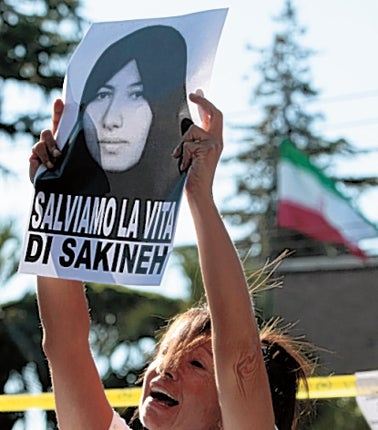Iran says it is 'reviewing' stoning sentence

Your support helps us to tell the story
From reproductive rights to climate change to Big Tech, The Independent is on the ground when the story is developing. Whether it's investigating the financials of Elon Musk's pro-Trump PAC or producing our latest documentary, 'The A Word', which shines a light on the American women fighting for reproductive rights, we know how important it is to parse out the facts from the messaging.
At such a critical moment in US history, we need reporters on the ground. Your donation allows us to keep sending journalists to speak to both sides of the story.
The Independent is trusted by Americans across the entire political spectrum. And unlike many other quality news outlets, we choose not to lock Americans out of our reporting and analysis with paywalls. We believe quality journalism should be available to everyone, paid for by those who can afford it.
Your support makes all the difference.Iranian authorities have suspended the execution by stoning of a woman convicted of adultery, the foreign ministry said yesterday, after weeks of condemnation from around the world.
"The verdict regarding the extramarital affairs has stopped and it's being reviewed," the foreign ministry spokesman Ramin Mehmanparast told Iran's state-run English-language Press TV.
The statement came a day after the European Commission president, Jose Manuel Barroso, called the stoning sentence against Sakineh Mohammadi Ashtiani "barbaric beyond words".
She was convicted of adultery – a capital crime in Iran – in 2006. She has also been charged with involvement in her husband's murder.
In a live telephone interview, Mr Mehmanparast said the murder charge was "being investigated for the final verdict to be issued".
Adultery is the only crime which carries the penalty of death by stoning under the sharia law which Iran adopted after the 1979 Islamic revolution.
The death penalty for murder in Iran is by hanging. The lawyer said Ms Ashtiani might receive 15 years' jail if convicted of being an accomplice to murder.
At no point in the interview, which was in the Farsi language but was dubbed over by a simultaneous translation into English, did Mr Mehmanparast mention "stoning", referring merely to Ms Ashtiani's "death sentence". "We think that this is a very normal case," he said. "This dossier looks likes many other dossiers that exist in other countries."
Human rights campaigners, intellectuals and politicians in Europe, including the French President, Nicolas Sarkozy, and his wife, Carla Bruni, have taken up Ms Ashtiani's cause.
Karim Lahidji, Paris-based president of the Iranian League for the Defence of Human Rights, told the France 24 television channel: "We are very happy with the result of this campaign... even though, to this day, no decision has been made in a court. As long as she is not freed, we really don't know if this case is definitely closed."
Mr Mehmanparast blamed the United States for stirring up the furore to hurt Iran's international image as it faces sanctions aimed at curbing its nuclear programme. "It looks like they are playing a political game," he said.
"This lady's case that is being followed ... is in direct connection and relation with the soft war that is being waged against Iran and the aim is to create a rift in relations between Iran, Brazil and Turkey."
Brazil and Turkey have worked diplomatically to try to solve the impasse over the nuclear programme which Iran says is peaceful but which the United States and European countries suspect is aimed at making a bomb.
Join our commenting forum
Join thought-provoking conversations, follow other Independent readers and see their replies
Comments